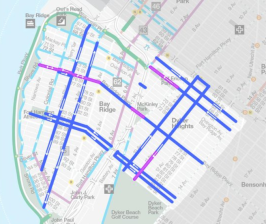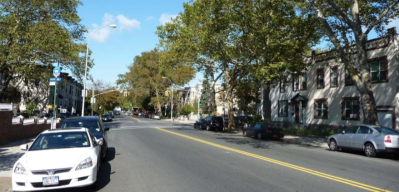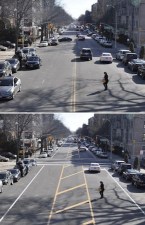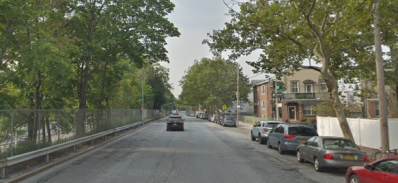Bay Ridge Workshop Shows Why DOT Can’t Seem To Get Anything Done
Instead of engineering for safety, the department bends over backward to placate local drivers.
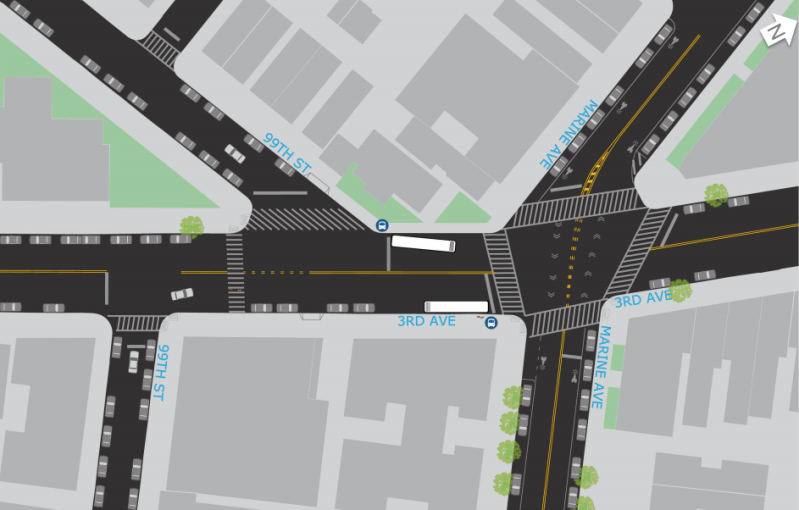
City & State NY is hosting a full day New York in Transit summit on Jan. 30 at the Museum of Jewish Heritage. This summit will bring together experts to assess the current state of New York’s transportation systems, break down recent legislative actions, and look towards the future of all things coming and going in New York. Join Keynote Speaker Polly Trottenberg, commissioner of the NYC Department of Transportation, along with agency leaders, elected officials, and advocates. Use the code STREETSBLOG for a 25-percent discount when you RSVP here!
Want an insight into how the Department of Transportation slows down critical safety improvements by genuflecting before drivers? Look no further than the process it is undertaking to redesign just two intersections in Bay Ridge.
On Thursday, the agency offered yet another installment in its five-year saga to improve safety at Third Avenue and Marine Avenue and Third Avenue and 99th Street — in this case, a workshop for community members at Brooklyn Community Board 10’s Traffic and Transportation Committee.
The workshop — to gather input on five alternative designs [PDF] for the messy, offset intersections — was the third time that the DOT took the issue to the community board since the spring of 2018. That’s almost two years of discussions over two crossings that are in a city-designated “Senior Safety Area.”
The workshop showed how the DOT bends over backward to prioritize car movement and placate the “Not In My Back Yard” crowd of car-owners, similar to the process it undertook in trying (and failing) to establish a Bay Ridge bike network. It consults the community every step of the way, instead of simply engineering streets and roads for safety so that seniors don’t get killed while crossing the street, a huge problem in Brooklyn and citywide.
At the intersections in question — wide crossroads where pedestrians must negotiate four lanes of traffic — there have been 16 injuries (two severe) between 2013 and 2017, according to the DOT. The agency’s goal is to shorten the crossings and to slow the turns of drivers — but it is unwilling to determine how to do that without years of input from local drivers.

The controversy over the intersections started in January 2015, when DOT installed a traffic light midblock on Third Avenue, where it meets the westward part of 99th Street, on the heels of a study undertaken in response to community complaints regarding safety. That light proved unpopular, with motorists complaining that it screwed up traffic because a stop sign regulates the intersection of Third Avenue and eastern side of 99th Street; the combination of the two kinds of signals presented timing issues for motorists and dangers for pedestrians, locals said.
Given the complaints, CB 10 wrote to the DOT in May 2015 requesting fixes and pedestrian-safety improvements. In June 2018, the DOT came back with a plan to improve the crossings by standard techniques, such as creating “neckdown” sidewalk extensions and realigning crosswalks — but the plan did not change the signalling patterns or deal with the traffic-light issue.
So the community board asked the DOT for an engineering review of the signalling, and in October 2019 the department returned to CB10 with a proposal that would have reversed the flow of 99th Street west of Third Avenue from northbound to southbound.
That would have enabled DOT to eliminate the offending traffic light on the western side of 99th and Third Avenue, replacing it with a light at the intersection of the eastern flank of 99th and Third Avenue. But the idea of reversing the direction of 99th Street was anathema to some residents and that plan, too, ran into vociferous opposition.
So, on Jan. 14 there was DOT workshopping five alternatives for the intersections of the two sides of 99th Street and Third Avenue.
The five options presented publicly (and in this document, starting on page 23) are:
- Option A: Pedestrian improvements with no traffic changes (similar to what was presented in June 2018),
- Option B: Adding the east leg off 99th Street to the existing signal, with both 99th Streets making right turns only in order to turn simultaneously,
- Option C: Adding the east leg of 99th Street to the existing signal, with both 99th Streets making left turns only in order to turn simultaneously,
- Option D: Reversing 99th Street from Third Avenue to Shore Road (similar to what was presented in October 2019, with modifications), and
- Option E: Reversing 99th Street from Third Avenue to Fort Hamilton Parkway.

Some attendees made snide comments as they toured the five stations of the workshop, which consisted of posters on easels with the designs, with a DOT employee assigned to each to explain the distinguishing features.
Most comments concerned — you guessed it! — parking, and went beyond ordinary provincialism to indicate the attendee’s unique preference for where he or she parked or preferred to drive. Safety improvements that might keep attendees’ neighbors alive proved less important than free, on-street storage for private vehicles.
One woman who pointed to a spot on a poster and announced, “I live here, and I park there,” indicating a spot across the street from her house.
Another, Jean Balukas, who lives on Fourth Avenue between 99th and Marine, said that she preferred an option that did not change the direction of traffic on her side of 99th Street because “I park a lot of times on 99th.”
Local resident Laura Sergio called Option C “asinine and unreasonable” because it would inconvenience her driving.
Resident Dennis King asserted that the presence of Fontbonne Hall Academy, an all-girls Catholic High School, at the corner of 99th Street and Marine Road, made any plans to reverse the direction of the street impossible. “Making 99th a one-way street with all the kids coming out of school is suicide,” he said. DOT met with Fontbonne Hall Academy on October 1 to discuss the proposal.
The DOT gave each attendee two dots so that they could register for their first and second choices for the plans.
“Each year that we went to them, we really took it in, dug deeper to try and address their concerns,” a DOT representative at the event, Lauren Martin, said of the department’s interactions with the community.
Martin of DOT expressed confidence that all of the options presented were safer for pedestrians. By the end of the night, Option D had earned the most dot “votes.”
The department said it would digest the input from community members gathered at the workshop and return to the Community Board to present again. In fact, it is setting up an interactive webpage on the intersections in order to get even more feedback.
It is unclear when the agency intends to complete the two intersections.
